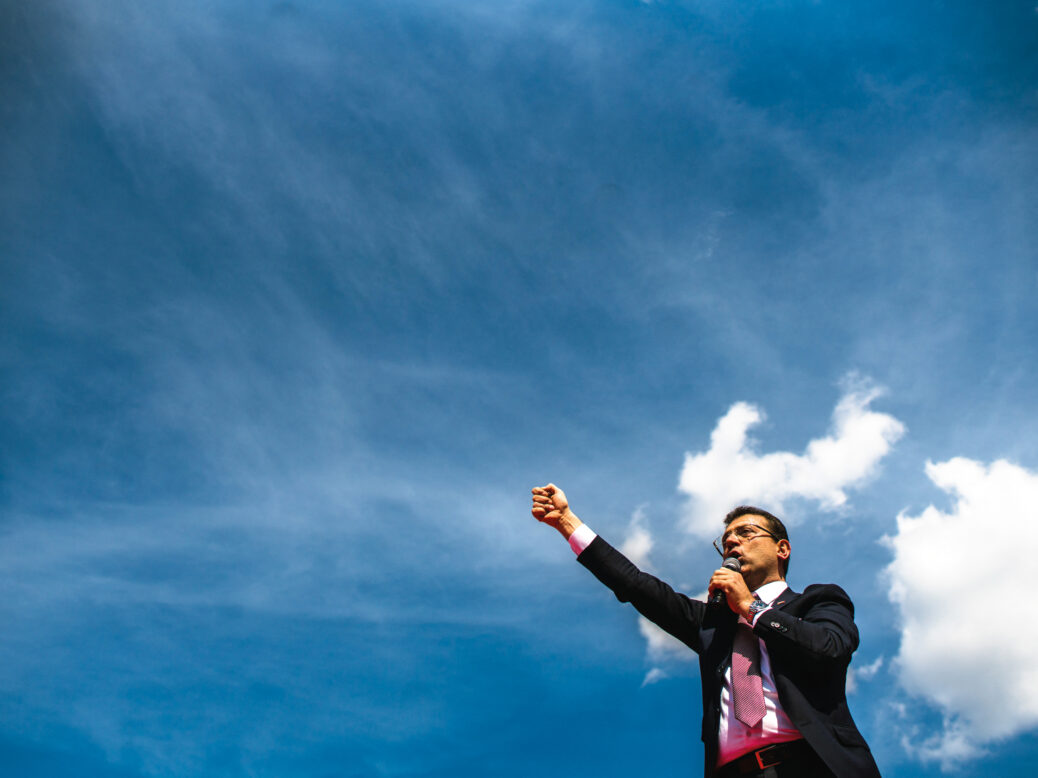
The politician who delivered Recep Tayyip Erdogan the biggest electoral defeat of his presidency is a businessman whose surname means “the son of an imam”. Ekrem Imamoglu, 49, who won Istanbul’s mayoral elections on 23 June, ironically has all the makings of a right-wing politician: roots in a nationalist town on the Black Sea, a career in the construction sector, and the ability to recite the Quran in Arabic. But Imamoglu’s win – 54 per cent against 45 per cent for Erdogan’s candidate of choice – was a victory for the leftist opposition that included Imamoglu’s Republican People’s Party (CHP) alongside pro-Kurdish and nationalist parties.
Since 1994, when Erdogan became Istanbul’s mayor, Turkey’s most prosperous city had been ruled by the Justice and Development Party (AKP) and its Islamist forebears. But Imamoglu’s unprecedented win was the largest margin of the past 35 years. He is now the politician to watch in Turkey, not only as a challenger to Erdogan’s strongman politics, but also as a potential leader for Turkey’s fragmented left.
Born in 1970, Imamoglu comes from a conservative family. His great-grandfather was a First World War veteran; his father served in a right-wing party as local administrator. During his childhood Imamoglu enrolled at Quran courses as well as playing football as a goalkeeper: his moniker was “the flying sack”. He dreamt of rising to fame as a sportsman, but his father sent him to business school in Cyprus.
Back home in Istanbul, Imamoglu opened a meatball restaurant in 1992, and settled in the middle-class district of Beylikdüzü. He worked for his father’s construction company before, in 2008, deciding to enter politics in Turkey’s main opposition party, the CHP.
Imamoglu’s rise was bolstered by social media – his advisers broadcast his every move on Facebook. In 2010, after Kemal Kılıçdaroglu became CHP leader, Imamoglu began the Solidarity Houses initiative, which provided food, clothing and furniture to thousands of underprivileged locals each year. He visited every house in his district and met young students in schools for imams. In 2014’s local elections he became Beylikdüzü’s mayor, with 50.8 per cent of the vote.
As soon as he announced his mayoral bid for this year’s elections, Imamoglu was made the subject of a hate campaign by the AKP-controlled press. Commentators dismissed him as an inexperienced leftist. But because Imamoglu was unknown, there was little prejudice against him among voters who would normally vote against the CHP. His conservative outlook and his promise of sex segregation in public pools also warmed him to the urban poor.
Imamoglu’s local election manifesto, titled “The Radical Love Book”, implored activists to give “love not only to those who already love you, but also to those who do not”. Using quotations from the writers John Fowles and Milan Kundera, the manifesto urged CHP activists to avoid polarisation and provocation: “A nation that stands strong and loves each of its members is a nightmare for hate-mongers… if we start the conversation by insulting the party that others vote for or their leader, nothing we say later will have any effect.”
These tactics won Imamoglu the March elections by less than a percentage point (13,700 votes). But the ruling AKP claimed irregularities, annulled the election, called Imamoglu a “liar” and a “terrorist”, and threatened him with prison. In just three months, Imamoglu’s margin multiplied by 59 times in the rerun poll, to 806,000.
Erdogan’s famous proclamation that “who wins Istanbul wins Turkey”, has become an ominous warning for his party’s future. Imamoglu’s trajectory overlaps considerably with the Turkish president. Both can recite the Quran by heart. Both dreamed of careers in football, but their fathers had other ideas. Both have fought off oppressive state prosecutors, dirty campaigns and jingoist columnists while rising to the mayoral seat. Both like to hug pedestrians on the street, and speak in the local street vernacular.
But their reaction to dissent divides them. During the uprisings in Istanbul’s Gezi Park in 2013, Erdogan called young Turkish protesters “looters” and “rabble-rousers”. Imamoglu’s tone was different: “Gezi Park protests delivered an immense message to Turkey’s political elite. Gezi taught manners to them.” Yet immediately after Imamoglu’s mayoral election win, 16 civil society leaders went on trial, accused of seeking to overthrow the government. All face imprisonment if convicted. Gezi continues to be the fault-line of Turkish politics.
Until the new presidential elections, scheduled for June 2023, this friction between two world views will determine Turkey’s future. Imamoglu has criticised Turkey’s intervention in Syria, has proposed to solve the Kurdish question on the basis of individual freedoms, and pointed to Obamacare as a good example of “humanising the violence of capitalism”.
The mayoral election doesn’t mean that Erdogan has lost support throughout Turkey. But it could mean a sea change for his party: disgruntled former allies are talking about creating a new political movement outside the AKP. The likeliest scenario is that Erdogan will remain unassailable until 2023, when Imamoglu may emerge as his challenger. But his loss in Istanbul will remind Erdogan how much Turks love an underdog – even if he is on the left.
Kaya Genç lives in Istanbul. His books include “The Lion and the Nightingale: A Journey Through Modern Turkey” (Bloomsbury)






